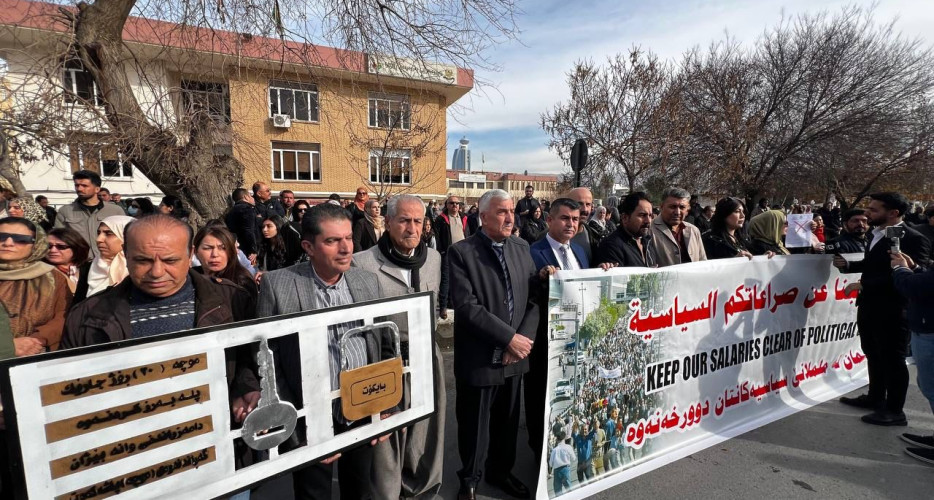
Peregraf
The Kurdistan Regional Government’s (KRG) ability to reach an agreement with federal authorities in Baghdad to amend the budget law will determine whether striking teachers and public servants return to work. If Erbil fails in this task, the strikers will continue their labor action until their demands are met.
Tens of thousands of teachers have been on strike in Sulaimaniyah and Halabja governorates since the beginning of the academic year in September. This effectively canceled the first semester for approximately 700,000 students, but now the second semester is at risk as well.
The main reason for the strike is that the KRG has not effectively responded to the teachers’ demands, which includesthe on-time payment of salaries, disbursement of backpay, resumption of promotion, and contracts for lecturers.
Due to the KRG’s financial problems, the government has been unable to pay salaries on time. Public servants are currently missing their pay for October, November, and December. As a result, the teachers are also demanding that Erbil not stand in the way of Baghdad stepping in to pay salaries directly.
The National Council of Protesting Teachers and Employees,which has organized the strikes and accompanying street demonstrations, released a statement on December 22, 2023 promising that the strike would continue if these demands were not met.
"Our only main demand is to be employed permanently, not on [limited] contracts," Karzan Fizik, a representative of the teachers, told Peregraf.
On January 7, KRG Minister of Education Alan Hama Saeed Salih, who is a member of the Kurdistan Democratic Party (KDP), released a letter responding to the strikers. He said that the KRG Council of Ministers had authorized two changes, namely that promotions would be resumed and the issue of the lecturers would be taken care of. The other demands were not addressed.
However, the minister’s letter said that the changes would only take place if there were amendments to the federal budget lawand if Baghdad began sending the Kurdistan Region’s budget share. This seems unlikely to happen in the near-term, given thecomplex tensions between Baghdad and Erbil regarding the budget.
Less than two hours after it was released, the National Council rejected the minister’s response and called for a mass demonstration on January 8. It also promised that the strike would continue.
"Conditioning the implementation of our demands and linking them to vague amendments to the Iraqi budget law is hiding from their implementation. We do not believe that this government intends to solve these problems," a representative of the Council told a press conference.
The representative said that the KRG had routinely broken its promises and had used hollow concessions to break past strikes.
"The letter of the Minister of Education has been published in the guise of an answer, but it is neither a decision nor an approval. Therefore, the Ministry of Finance can refuse to implement it on the grounds of lack of budget," they added.
The representative said that the minister had not included a timeline or addressed some of the teacher’s specific demandsabout contracts.
“There are teachers who have been teaching for 15 years. How many more years will they be contracted and when will they be employed permanently,” the representative demanded.
According to the three-year federal budget law, the Kurdistan Region's annual share is 16.6 trillion Iraqi dinars. However, Baghdad has not sent this money amid an ongoing dispute over the country’s oil and gas industry. The federal government accuses the KRG of failing to live up to its obligations under the budget.
With the pressure from teachers continuing, the KRG sent a delegation to the Iraqi capital for budget talks on January 6 to address the Kurdistan Region’s financial problems.
"Our main goal is to ensure the monthly salaries of public servants through the amendment of the budget law and toseparate out the salaries from the other problems that Erbil and Baghdad have," a source in the delegation told Peregraf.
"We demand that the Iraqi government continue to send 700 billion Iraqi dinars per month for the salaries of the KRG until the budget law is amended and the problem is resolved," the source added.
Iraqi Prime Minister Mohammed Shia al-Sudani has agreed toaddress these issues and send draft amendments to the Iraqi parliament.
According to an official letter seen by Peregraf, the three months of unpaid salaries left over from 2023 will be recorded by the KRG as debt, similar to the withheld salaries that have not been paid back to public servants from the 2014-2019 period. During that time, the KRG kept between 10% and 70% of each employee’s pay for 30 months as an austerity measure. Additionally, it missed twelve months of salary payments entirely.